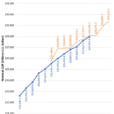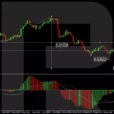When you choose a reliable and secure trading platform that choice is one of the most important things in investing, and the more you know about it the better.
In its basics, a trading platform is a software, app, or online tool that enables investors and traders to perform trading-related activities. When you choose a trading platform includes everything from checking the current market prices for individual assets as well as opening a position, managing, and closing it as the investor pleases. It is usually managed by brokerage firms or other authorized financial intermediaries.
 Before the digitalization, trading and investing in assets used to require a lot of manual processes usually performed by financial managers on the trader’s behalf. Today, it became much simpler with the availability of online trading platforms. They are easily accessible from anywhere and can be used without much technical knowledge.
Before the digitalization, trading and investing in assets used to require a lot of manual processes usually performed by financial managers on the trader’s behalf. Today, it became much simpler with the availability of online trading platforms. They are easily accessible from anywhere and can be used without much technical knowledge.
Below, we discuss all the different aspects of a trading platform before guiding you towards choosing the best platform to perform your trading activities.
Types of trading platforms
Mainly, there are two types of trading platforms based on the trading style and preferences they are designed to serve. These two types are known as commercial platforms and prop platforms.
Prop platforms are usually not available to retail investors, as they are usually designed by individual brokerage houses or other financial institutions to serve their specific professional trading needs.
Commercial platforms, on the other hand, are the platforms that are designed for retail investors and day traders. They usually offer a great variety of features to attract general traders. As a result, they also tend to be easier to use and require very little information to start trading.
Key features of commercial platforms
The main purpose of a trading platform is to enable traders to open a trading account and start investing in different securities and holdings; they also tend to come with a lot of related features. The most common features include real-time quotes, basic and professional charts, technical and fundamental analysis tools, news feeds, alerts, etc. Some commercial platforms of today also offer the functionalities to post, share, and discuss different things with other investors and traders, like in a social network. It is also quite common for some platforms to offer a virtual or dummy account, trading lessons, and premium researches. Not to mention the features to set a pre-order, stop loss, take profit, closing orders, etc.
Choosing a trading platform
Not every trading platform comes with the same features or the same requirements. Therefore, it is important that you carefully consider different aspects of a given platform and base the decision on your trading goals and objectives. Whatever are your motives though, you must check whether a platform is licensed and regulated by the appropriate authorities.
Fees are another sticking point to consider, while some platforms may have a much bigger threshold than your intended amounts. Also, don’t forget about the availability of different asset groups in your chosen platform.











Leave A Comment